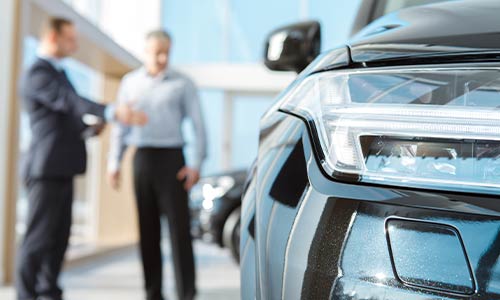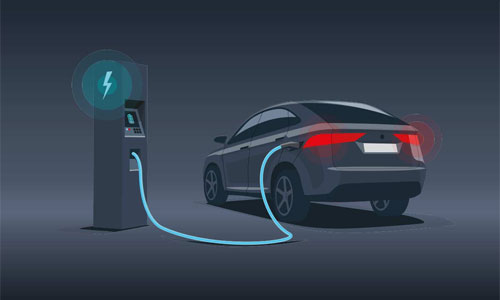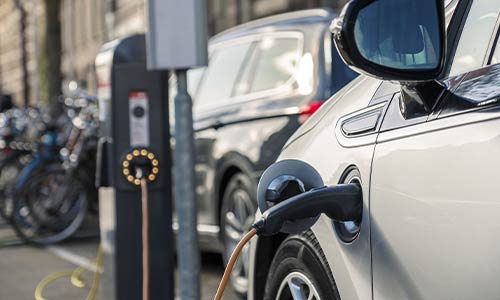
Electric car charger types and connectors
Last updated April 06, 2022
There are three types of chargers for electric vehicles, the type of connector you will need will vary dependent on the electric vehicle you have and the power rating or speed of the charge point and may affect the cost of charging an electric car.
Value your car in under 30 seconds
Rapid and Ultra-rapid chargers
Rapid and ultra-rapid electric chargers are the fastest type of charger as reflected in the name. These types of EV chargers are found at motorway services or in locations that are close to busy driving routes. This is due to their ability to charge the car as fast as possible when you are travelling and only have a short time to stop on your journey but need charge to get to your destination. Rapid chargers supply high power via a direct or alternating current.
Dependent on the model of your electric vehicle, it can reach up to 80% charge in just 20 minutes using a rapid charger. The rapid charger power unit will use the maximum charging speed available up to the 80% capacity mark as that is where the charging will significantly tail off to maximize charging efficiency and protect the battery to preserve its lifespan.
You can find the specification for your vehicle in your manual, or it will be easy enough to work out by looking at your power inlet and the cables available with the charger.
Rapid Direct Current or DC chargers provide their power at 50kW, these are the most common types of rapid charge points as they were the industry standard. The Rapid DC charger will charge an EV to 80% between 20 minutes to an hour depending on your car’s battery capacity.
Ultra-rapid chargers provide double the power of a rapid charger at 100kW. These are less common; they can reduce charging times, and newer EV models become increasingly popular on the roads. For vehicles that are compatible with this level of charging power, it keeps charging time down to 20-40 minutes, even for models with larger batteries. We would not recommend regular use of rapid chargers due to the risk of reducing your electric car battery life span.
Tesla’s supercharger network also provides up to 150kW. However, these charging stations will only use Tesla Type 2 connectors or Tesla CCS connectors and are restricted for Tesla owners.
Fast chargers
Typically, fast chargers are either 7kW or 22kW and most provide an Alternate Current charge, however, sometimes you may find there are 25kW Direct Current chargers. Dependent on your EVs inlet, it can take a Type 1 charger that is capable of handling 22kW 1-2 hours to charge your vehicle. For Type 2 connecter vehicles, which are more common across Europe, they will only be compatible with 7kW chargers and can take 4-6 hours to charge your car. Type 1 fast chargers are untethered and are therefore universal for most vehicles, however, some will be tethered, and these are most likely to be the Type 2 connector type.
Charging rates when using a fast charger will depend on the car’s on-board charger as not all models will be able to accept 7kW or more. If your car does not accept the higher kW, you will still be able to use it, your vehicle will only accept the maximum power the on-board charger can take.
Something to note is that Tesla have a modified version of the Type 2 charger, named the combined charging system or CSS – this allows their fleet to use both domestic chargers and their network of superchargers.
Slow chargers
Many slow chargers are 3kW to 3.6 kW, charging is conducted between 2.3kW and 6kW. Slow charging is common for EV users as a method of charging at home as it takes longer to charge. Slow chargers are available in public places, however, they have become outdated as faster units are more readily available.
Domestic sockets
Electric vehicles can be charged using the typical 3-pin sockets found in all homes. The charger will plug into the 3-pin plug which will connect to a small transformer box – this will either be type 1 or type 2 dependent on your EV and will plug into your car at the other end of the lead. EV owners are advised to use this in an emergency as any prolonged use can potentially cause damage to home wiring.
Wall boxes can be installed on your home so you can charge your vehicle overnight. There are options to install 3.6kW, 7kW and 22kW home chargers so they can support both Type 1 and Type 2 vehicle capabilities. There are also government grants and incentives available to make wall boxes more affordable for EV owners. We have gone into further detail on government grants and incentives around electric vehicles here.
FAQs
This is dependent on the provider of the wall box you choose. However, the industry average is around £450, and you could pay as little as £100.
Dependent on the provider, installation of a home EV charger can take as little as two hours.
There are varying factors that have an impact on the charge time of your EV, including the size of the battery in your car and the speed of the charging point you are using. It could be charged in as little as 30 minutes, whereas it can take up to 12 hours or more under certain circumstances.
You can find the type of charger and kW your car can take in your manual. You will also be able to work this out by looking at your car inlet in comparison to the tethered wires at the charging point you are using.
Car parks or supermarket charge points are sometimes free to use for the duration of your stay. Rapid charging points found at service stations on the motorway are around £6.50 for 30 minutes of charge.





